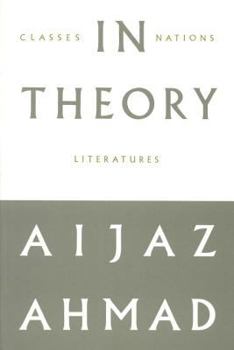In Theory: Classes, Nations, Literatures
Select Format
Select Condition 
Book Overview
After the Second World War, nationalism emerged as the principle expression of resistance to Western imperialism in a variety of regions from the Indian subcontinent to Africa, to parts of Latin... This description may be from another edition of this product.
Format:Paperback
Language:English
ISBN:0860916774
ISBN13:9780860916772
Release Date:May 1994
Publisher:Verso
Length:368 Pages
Weight:1.35 lbs.
Dimensions:0.8" x 6.1" x 9.1"
Age Range:18 years and up
Grade Range:Postsecondary and higher
Customer Reviews
3 ratings
Marxism against postcolonial theory
Published by Thriftbooks.com User , 14 years ago
This publication of "In Theory: Nations, Classes, Literatures" is a reprint from Aijaz Ahmad's essential 1992 critique on postcolonial thought and the associated 'Third Worldism' of the First World intellectuals. Writing from a consistent and sensible Marxist perspective, Ahmad, a Pakistani working in India, criticizes the one-sidedness and posturing prevalent in so much hip academic postcolonial theory. Although the book itself is not entirely free of the terrible use of language that is the hallmark of this theoretical approach, with the occasional "discourse", "mapping" and "interrogating" making their appearance, Ahmad succeeds very well at dissecting the errors and bad faith that are at the core of the postcolonial enterprise in Western academia. The first of these errors is the idealism of postcolonial theory. That is, postcolonial theorists are uninterested in economics, in politics, even in such simple things as facts and causes; all these are mere 'narratives', and any attempt at systematically analyzing those or bringing them into an analysis of literature is to be derided as 'totalizing narratives', the gravest crime in this branch of academia. As a result, each text and each author is a disembodied whole. No understanding of nation or class exists, because all analyses are just narratives, and as a result all theory is reduced to stories about stories, with no end and no beginning, and no grounding in any reality. At the same time, Ahmad notes that they tend to support the concept of 'Third World literature' or 'Subaltern studies', implying that there is a unity in the developing world that makes any text from there, or in some arbitrary manner associated with it, subversive and superior for that reason alone. This completely ignores the great differentiation in class, culture, politics and religion that exists within and between the various developing natures. It also utterly fails to properly analyze the position of given 'Third World writers' within this - Ahmad points to the case of Rabindranath Tagore, who is considered a canonical 'Subaltern' writer, despite the fact that within the context of Indian literature his works are considered conservative and elite. As Aijaz Ahmad notes, it is no coincidence that much of this postcolonial paradigm has been and is being produced by academics who are emigrants from developing nations within the developed world, and as relatively upper class people from poor countries benefit the most from a mode of analysis that contrasts only the West and the rest (in favor of the latter), while ignoring or denying any internal differentiations. Much of the book is taken up by a systematic study of the works of Fredric Jameson, Edward Said and Salman Rushdie in this context. Rushdie gets a short treatment, where Ahmad relativizes his importance in literature and somewhat gratuitously accuses him of poorly portraying women. Jameson he criticizes for using the concept of the three worlds in such a mann
The Continuing Salience of Marxist Critique
Published by Thriftbooks.com User , 15 years ago
Though first released in 1992, Aijaz Ahmad's In Theory retains today the same theoretical relevance as when it first appeared. Ahmad is mad as hell with the state of postcolonial theory, and he's not taking it anymore. Beginning with a survey of developments in world capitalism and literary theory, Ahmad goes on to produce in depth readings of several exemplars of postcolonialism, most notably Edward Said and Salman Rushdie. Also incuded is Ahamd's devastating polemic against Fredric Jameson's theory of the "national allegory" in third world literature. All in all, this is a brilliant collection of essays, and a necessary step towards a theorization of imperialism and its effects. That said, it has a few flaws. Most notable is Ahmad's tendentious soft Stalinism. Whenever a theorist he discusses refers to the Soviet Union as imperialist, Ahmad, for whatever reason, feels compelled to point out that this is really an echo of the "Maoist theory of convergence." In 2008, fighting the Sino-Soviet feud is even less relevant than it was in 1992.
A radical Marxist critique of the recent postcolonial hype.
Published by Thriftbooks.com User , 26 years ago
Aijaz Ahmad is one of those critics who are not afraid of exposing the shortcomings of any despotic cultural signifier. Ahmad is a Marxist critic and, in this book, has exposed the essentialism in the thought of Fredric Jameson, Edward Said and many others. The book is a must read for anybody interested in postcolonial literatures, critical theory, cultural studies, Indian literature in English, Marxism and neo-colonialism.





